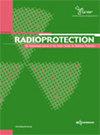MEDIRAD formulation of science-based recommendations for medical radiation protection: a stakeholder forum survey
IF 1.8
4区 医学
Q4 ENVIRONMENTAL SCIENCES
引用次数: 4
Abstract
MEDIRAD (Implications of Medical Low Dose Radiation Exposure) is an innovative European research project funded by EURATOM which seeks to bring closer together the nuclear and medical research communities in order to advance science for radiation protection in radiotherapy, nuclear medicine, and diagnostic and interventional radiology. The project also aims to promote links between science and society, with the goal of better protecting patients and professionals, through the publication of recommendations based on MEDIRAD research findings (http://www.medirad-project.eu/). The MEDIRAD Stakeholder Forum (SF) was designed to set up a dialogue between the Consortium member organisations and the society regarding the recommendations, which are expected from this project. We envisage three successive steps in this dialogue (1: first SF consultation identifying the needs for improved medical radiological protection; 2: drafting science based MEDIRAD recommendation and 3: second SF consultation to collect feedback), which are implemented throughout the project. A first overview of input of the Stakeholder Forum about the topics to be addressed in the MEDIRAD recommendations, based on an exploratory questionnaire, is presented in this article. Quantitative and qualitative in-depth analysis leads to the identification of 11 priority thematics.医疗辐射防护科学建议的制定:利益攸关方论坛调查
MEDIRAD(医疗低剂量辐射照射的影响)是由欧洲原子能共同体资助的一项创新性欧洲研究项目,旨在使核研究界和医学研究界更加紧密地联系在一起,以推进放射治疗、核医学以及诊断和介入放射学中的辐射防护科学。该项目还旨在通过发表基于MEDIRAD研究结果的建议,促进科学与社会之间的联系,以更好地保护患者和专业人员(http://www.medirad-project.eu/)。MEDIRAD利益相关者论坛(SF)旨在建立联盟成员组织与社会之间的对话,就该项目所期望的建议进行对话。我们设想在这一对话中连续采取三个步骤:(1)第一次SF磋商,确定改进医疗放射防护的需要;2:起草基于科学的MEDIRAD建议;3:第二次SF咨询以收集反馈),并在整个项目中实施。本文基于一份探索性问卷,首次概述了利益相关者论坛关于MEDIRAD建议中要解决的主题的输入。通过定量和定性的深入分析,确定了11个优先主题。
本文章由计算机程序翻译,如有差异,请以英文原文为准。
求助全文
约1分钟内获得全文
求助全文
来源期刊

Radioprotection
ENVIRONMENTAL SCIENCES-PUBLIC, ENVIRONMENTAL & OCCUPATIONAL HEALTH
CiteScore
3.30
自引率
54.50%
发文量
35
审稿时长
>12 weeks
期刊介绍:
Radioprotection publishes articles on all aspects of radiological protection, including non-ionising as well as ionising radiations. Fields of interest range from research, development and theory to operational matters, education and training. The very wide spectrum of its topics includes (theoretical and practical aspects): dosimetry, instrument development, specialized measuring techniques, epidemiology, biological effects (in vivo and in vitro) and risk and environmental impact assessments.
 求助内容:
求助内容: 应助结果提醒方式:
应助结果提醒方式:


